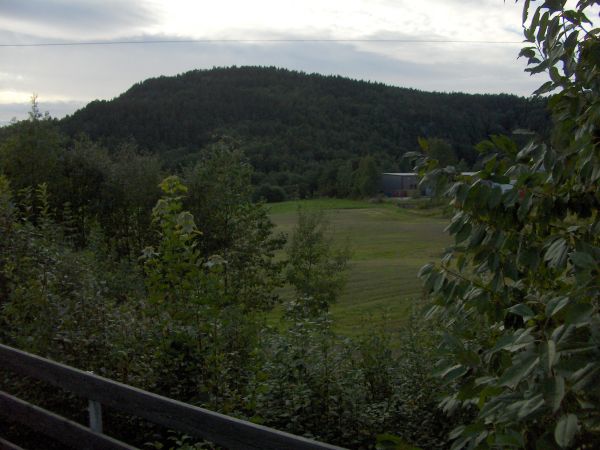Saturday 16 September 2006

|
Pic of the day: Where the suburbs meets the farmland. Photo taken from inside the writer's garden fence. Housing (wrong answer)There are two opposite views on housing prices here in Norway. One group of economists look to the USA, where the growth has slowed and in some parts of the nation crumbled. They predict that whatever ails big brother, little brother will soon come down with the same. You can't have house prices increasing 15% a year when wages rise 1.5% per year, because eventually nobody would buy houses except those who already had houses to sell. That's what economists call a "null-sum game", nobody gets richer unless someone else gets poorer. Of course, wages rise quite a bit faster here in Norway. But rarely more than 5% a year, and house prices rise on average 10% a year, lately more. Says the other camp of economists: This is not a bubble, it reflects underlying supply and demand. For years now there have not been built enough new homes for the people who want them, so they are bidding over each other to get a place to live. With ever more people living in single households, and some immigration as well, people are itching to get a place of their own. There is something to that. The higher the price of existing homes, the more people will pay for a newly built home. And the more profit there is in building and selling homes, the more of them will be built, all things being equal. Of course, all things aren't equal. Like pretty much everywhere in the rich world, building is strongly regulated. An area must be zoned for residential building, and there are minimum standards of many kind. For instance, all new Norwegian houses must be able to withstand a strong earthquake, even though there have not been one here since the age of dinosaurs or so. More reasonably there are strong standards for insulation, and roofs must be able to withstand more snow than we have seen in living memory. You never know, what with the climate change and all. Some say the Gulf stream may shut down if the global warming continues. In this situation you would expect people to counter by reducing the one variable for which there is not a strict minimum standard: Size. You don't shave off all that much of the price by trimming a bit here and there, but it does add up. But that's not what happens. On the contrary, people build the largest house allowed on the lot. These days, I live in a nice, small house where the suburbs meet the farmlands. The house is less than 40 years old, and a generation ago a family lived nicely here. But these days you can't get newlyweds to rent it; it is too small. That's nice for me, since I get to rent it at an affordable price. But it says something rather disturbing about the current crop of Norwegians. The housing market seems to have split largely into three segments. The families want to live in large houses outside the city. The singles and the elderly want to live in small apartment in the local downtown. And the immigrants live apart, in their own parts of the city. Technically, there is no reason why you couldn't build smaller, more affordable houses. Also, Norway consist almost entirely of wilderness, some of which is safe to build on. If you are willing to drive 10 minutes further, there is a good chance that some hillside could be used for new homes. Seriously, we could accommodate several million new people if space was the problem. It is not. There are other problems, however. Apart from the demand for large houses for families, there is the problem of getting them built in the first place. The Norwegian economy is running at full speed now, and houses are not the only things to build. I guess the "experts" were wrong who said, during the previous boom in the 1980es, that we were building office and business property enough for 40 million people in a country with 4 million. We're 4.5 million now, but once again shops and offices are being built at a frenetic pace, tying up much of the construction industry. As a matter of fact, we would not have enough manpower if we did not hire in many workers from Poland, as well as some from Sweden as usual. (But Sweden is also running fairly well, in that the official unemployment is quite low, so many Swedes have returned home.) When the economic weather changes (I won't even say climate, because these things vary so quickly) there is going to be a sudden stop in the building of business property. It is typically the part most sensitive to change. If it really is such a pent-up demand for housing, that should be the time to start building. But experience from the previous boom and bust shows that the housing construction too came to a skidding halt. The reason for this was no doubt that with the much higher interest rates, people could no longer afford large houses. There were actually built some smaller houses last time; I have seen them. But not a lot. Evidently people will rather not buy at all than have something less than opulent. I'm not sure where they live in the meantime. With mom and dad? Do married couples delay their separation until they can afford a better house? Perhaps I will find the answers this time, seeing as I am older, wiser or at least more conscious of the world around me this time than in 1990. But I maintain that it is impossible for house prices to rise three times as fast as wages for any considerable length of time. You will have to find other answers. |
Yesterday <-- This month --> Tomorrow?